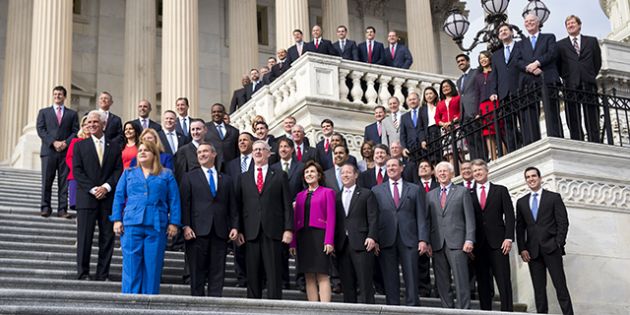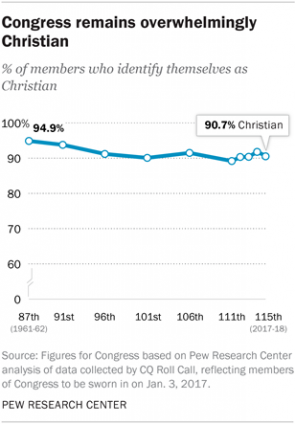Believers in US continue to fall, but Christians still strongly represented in Congress

The Christian credentials of U.S. president-elect Donald Trump may seem suspect to many progressive believers as he gets ready to step into office Jan. 20.
It is well known, however, that voting analysis showed in the presidential election, he had strong support from evangelicals and many Catholics.
By the time the votes were totalled, 81 percent of white evangelical and born-again Christian voters had cast their ballots for Trump, even if the real estate mogul on his thrid marriage is an adulterer who has boated about sexual assault, Alertnet reported.
But will this count for anything in the new U.S. Congress that was voted for on the same day as Trump upset the pundits and strode into the presidency?
His powerful showing of electoral college votes even if he got around 2.8 million votes than his rival Hilary Clinton shocked the world, which is digesting the impending reality of Trump on the political stage.
Yet how is Trump going to fare with those in Congress in an America where the share of believers has been shrinking for many years?
American adults who describe themselves as Christians have been declining for some time, but the U.S. Congress is about as Christian today as it was in the early 1960s, according to a new analysis by Pew Research Center.
Indeed, among members of the new, 115th Congress, 91 percent describe themselves as Christians.
This percentage is almost the same as in the 87th Congress (1961 to 1962, the earliest years for which comparable data are available), when 95 percent of members were Christian.
Among the 293 Republicans elected to serve in the new Congress, all but two identify as Christians; there are two Jewish Republicans – Lee Zeldin of New York and David Kustoff of Tennessee – who both serve in the House.

While Democrats in Congress are overwhelmingly Christian (80 percent), but there is more religious diversity among them.
The 242 Democrats in Congress include 28 Jews, three Buddhists, three Hindus, two Muslims and one Unitarian Universalist. There is also one member of Congress who describe herself as religiously unaffiliated, Rep. Kyrsten Sinema, a Democrat from Arizona.
In addition, all 10 members of Congress who decline to state their religious affiliation are Democrats.
As with the whole nation, Congress has become much less Protestant over time.
PROTESTANT REPRESENTATION IN CONGRESS DECLINES
The total percentage of Protestants in Congress has whittled down from 75 percent in 1961 (at the beginning of the 87th Congress) to 56 percent today.
Catholics during this period have grown in representation from 19 percent to 31 percent.
Among the Republicans in the new Congress, 67 percent are Protestant, while 27 percent are Catholic.
The breakdown between Protestants and Catholics is more even among the Democrats; 42% of the Democratic members are Protestants and 37 percent are Catholics.
These are some of the key findings from an analysis by Pew Research Center of congressional data compiled by CQ Roll Call.
CQ Roll Call gathered information on the religious affiliations of members of Congress through questionnaires and follow-up phone calls to members' and candidates' offices.
The new analysis compares the religious affiliations of members of Congress with Pew Research Center survey data on the U.S. public.
The analysis finds that some religious groups, including Protestants, Catholics and Jews, have greater representation in Congress than in the general population.
Jews, for example, account for 2 percent of the U.S. adult population but account for 6 percent of Congress.
Other groups such as Buddhists, Mormons, Muslims and Orthodox Christians, are represented in Congress in roughly equal proportion to their share of the U.S. public.
Most notably underrepresented, however, is the religiously unaffiliated.
This group is also known as religious "nones" and now accounts for 23 percent of the U.S. general public but just 0.2 percent of Congress.
Kyrsten Sinema of Arizona is the only member who describes herself as religiously unaffiliated.
"Among Protestant denominational families, Baptists had the biggest losses (down seven seats), followed by Anglicans and Episcopalians (down six seats). Nondenominational Protestants gained a total of three seats," writes Aleksandra Sandstrom in the Pew analysis.
"Protestants in the 'unspecified/other' category also gained six seats. The number of seats held by members of other Protestant groups remained roughly the same."